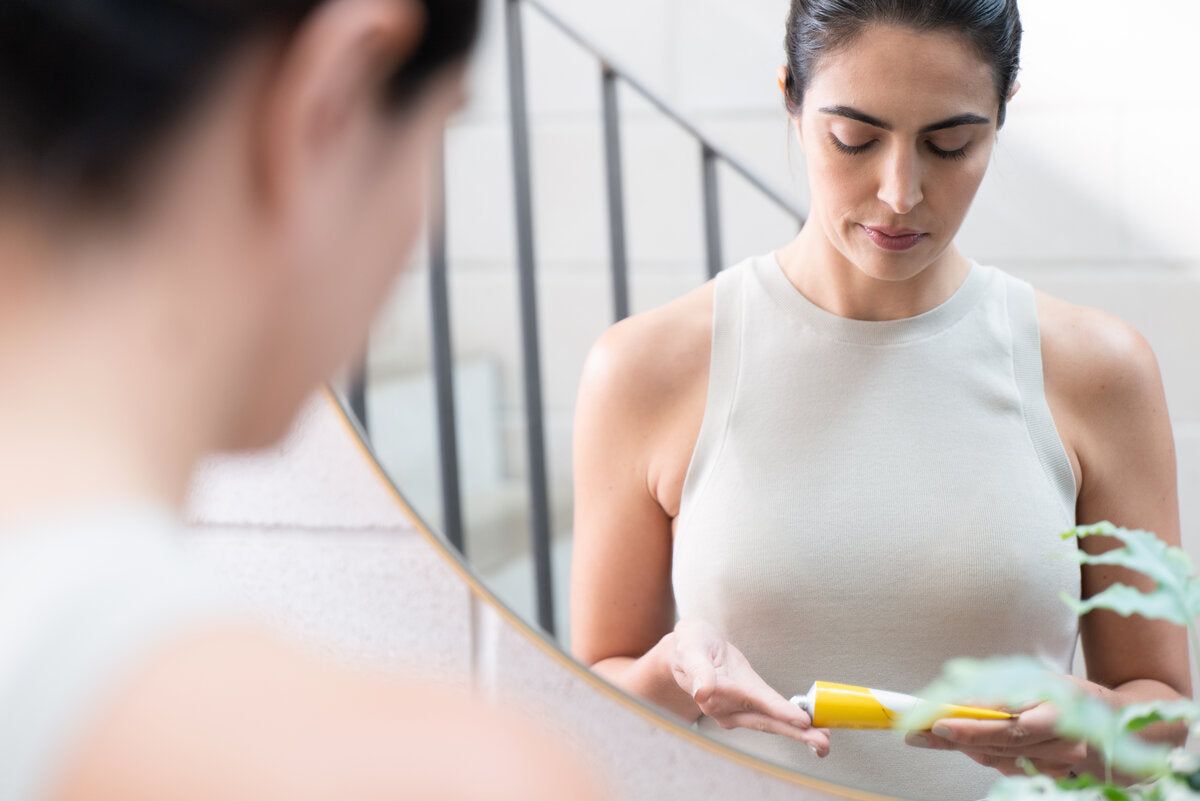Our skin covers an area of about two square meters, making it the largest organ in our bodies. It has an important task: to protect us from outside hazards and contaminants, such as pollution, UV rays and extreme temperatures.
With proper skincare, we can support our protective organ in its essential function. Yet given the ever-growing selection of creams, ointments, oils, peelings and more at our disposal, where do we even begin? Additionally, many cosmetic products consist of synthetic fragrances, colourants and preservatives, which, unfortunately, don't help our skin and can actually harm both our body and the environment too [1] [2].
That’s why when it comes to skincare, less is more. With simple skincare tips like these below, we can do something good for ourselves everyday — completely free from artificial ingredients.
What does your skin type need?
Every person is different, right down to our own skin. And the better we know our skin, the better we can pamper it.
Skin types are typically classified into the following categories:
- Normal skin is the simplest type of skin and requires little maintenance.
- Dry skin is skin that releases too much water, leaving it dehydrated. People with this type of skin should avoid products that contain perfume or alcohol, as these ingredients remove even more moisture from the skin.
- Oily skin is characterised by the excessive production of oil (“sebum”) on the skin’s surface. Soaps and oily cosmetics can exacerbate this condition, often resulting in blemishes.
- Combination skin is typically dry on the cheeks yet oilier on the nose, forehead and chin. Proper facial care is crucial here: Only cheeks need extra moisture, while the T-zone does not.
- Sensitive skin tends to become irritated when exposed to cosmetics, perfume and/or the weather. Natural products are best suited for people with this skin type.
- Blemished skin is characterised by pimples, blackheads and other blemishes. It is often a result of generics and an unhealthy lifestyle. More on that later.
Proper facial care: make-up removal
The skin types described above refer mainly to the skin on our face. It’s important we remove our make-up every evening before bedtime — no matter our skin type. Otherwise our pores cannot breathe and become clogged overnight, making skin impurities inevitable.
Anti-aging skin care: avoid the sun
The warm touch of the sun’s rays on our skin can feel like heaven for the sun worshippers among us. In fact, the sun’s rays are a good source of vitamin D, which is important for our bones and our overall well-being. However, it is advised to keep our sun exposure to a minimum, as the sun’s UV rays, in particular, can also damage our skin, causing it to lose its elasticity and form wrinkles more quickly, as well as increase our risk of developing skin cancer [3].
Regardless of whether you’re light or dark skin-toned, you can support your skin’s health significantly by avoiding prolonged direct exposure to the sun. When you are out in the sun, a hat and sunglasses should be part of your basic accessories for high-quality skin protection against the sun.
Pampering routine for cold days
On cold winter days, when the heaters are on at full blast, our skin can become tight and is prone to cracking and itching as the dry air removes moisture from the skin.
This is when our skin especially craves extra moisture. Treat yourself to a nighttime self-love ritual, using body lotion and a natural cream for proper facial care that cares for your skin. Yet be careful not to overdo it. Some studies suggest that skin that becomes accustomed to a supply of moisture can increasingly dry out on days it doesn’t receive lotion [4].
DIY Skincare
In addition to the vast array of beauty products at our disposal, we can do our skin some extra good with simple, do-it-yourself skincare tips. It’s not scientifically proven, yet the following have been said to be effective home skincare remedies: apple cider vinegar to treat blemishes, curds with honey to add moisture, alternating hot and cold showers for firmer skin and black or green tea bags for more glowing skin on the face and to relieve swelling especially around the eyes.
If you’d like to try extracting essential oils and make your own scented soaps or creams, learn about the tradition of enfleurage and then use our DIY instructions to make them at home.
Good products come at a price
When it comes to skincare, we don’t have to rely on a wide range of cosmetic products. On the contrary: Cutting back can actually do our skin some good. Frequent washing with soap, for example, can damage the outer layer of skin and lead to dry skin. Just twice a day for the face and three times a week for the body can be sufficient.
Our choice of soap (and all other skincare products, too, for that matter) is also crucial, because it’s the ingredients that count most. Our face cream The Glow has natural ingredients such as cinnamon and zinc to help protect, heal and delight the skin. It also includes plant-based cannabidiol, which can have a positive effect on our skin’s health, and plant-derived terpenes to support the powerful effects of the natural raw materials.
High-quality skincare products tend to be more expensive — yet we’re confident that your skin will thank you in the long run.
Skincare, from the inside out
Topical products and home remedies do little for our skin if we’re not already taking care of the rest of our body. That’s because our skin also relies on our internal organs and blood vessels to function properly. Each time our body doesn’t get enough sleep or nutrients, or consumes cigarettes or alcohol, or suffers from stress, this can have a significant impact on the health of our skin too.
Hence, our most important tip for natural and sustainable skincare is to be good to yourself, steer clear of toxins such as alcohol and cigarettes, and nourish yourself with a wholesome diet that’s rich in vital substances, and a healthy routine that features getting enough sleep and regular relaxation.
[1] Chemical Exposures: The Ugly Side of Beauty Products
https://www.ncbi.nlm.nih.gov/pmc/articles/PMC1253722/
[2] Comparative Study Of Synthetic And Herbal Cosmetic Products For Their Toxicity Assessment By Microbial Bioassays
https://www.ijstr.org/final-print/aug2019/Comparative-Study-Of-Synthetic-And-Herbal-Cosmetic-Products- For-Their-Toxicity-Assessment-By-Microbial-Bioassays.pdf
[3] Sun and Skin: The Dark Side of Sun Exposure
https://newsinhealth.nih.gov/2014/07/sun-skin
[4] Effect of Long-term Use of Moisturizer on Skin Hydration, Barrier Function and Susceptibility to Irritants
https://www.medicaljournals.se/acta/download/10.1080/000155599750011705/

